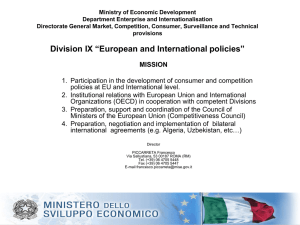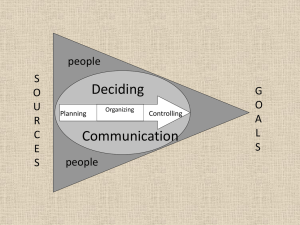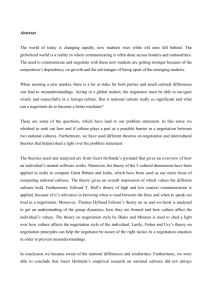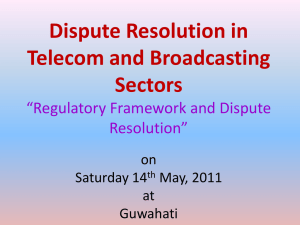Processes of International Negotiation
advertisement
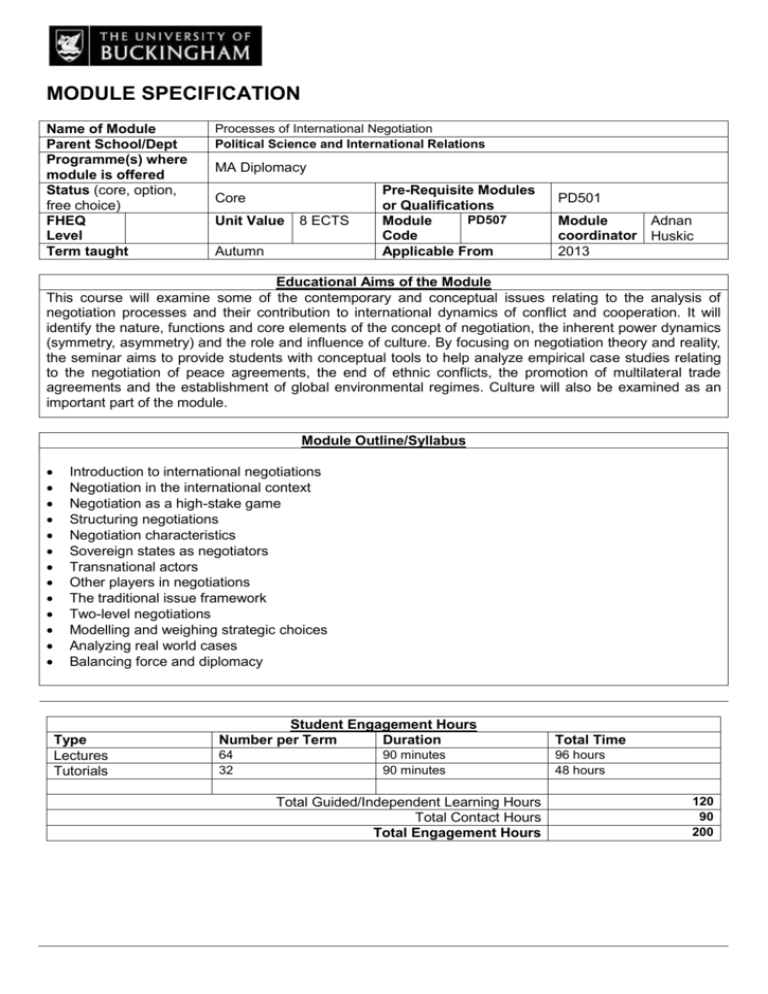
MODULE SPECIFICATION Name of Module Parent School/Dept Programme(s) where module is offered Status (core, option, free choice) FHEQ Level Term taught Processes of International Negotiation Political Science and International Relations MA Diplomacy Core Unit Value 8 ECTS Autumn Pre-Requisite Modules or Qualifications PD507 Module Code Applicable From PD501 Module Adnan coordinator Huskic 2013 Educational Aims of the Module This course will examine some of the contemporary and conceptual issues relating to the analysis of negotiation processes and their contribution to international dynamics of conflict and cooperation. It will identify the nature, functions and core elements of the concept of negotiation, the inherent power dynamics (symmetry, asymmetry) and the role and influence of culture. By focusing on negotiation theory and reality, the seminar aims to provide students with conceptual tools to help analyze empirical case studies relating to the negotiation of peace agreements, the end of ethnic conflicts, the promotion of multilateral trade agreements and the establishment of global environmental regimes. Culture will also be examined as an important part of the module. Module Outline/Syllabus Introduction to international negotiations Negotiation in the international context Negotiation as a high-stake game Structuring negotiations Negotiation characteristics Sovereign states as negotiators Transnational actors Other players in negotiations The traditional issue framework Two-level negotiations Modelling and weighing strategic choices Analyzing real world cases Balancing force and diplomacy Type Lectures Tutorials Student Engagement Hours Number per Term Duration Total Time 64 32 96 hours 48 hours 90 minutes 90 minutes Total Guided/Independent Learning Hours Total Contact Hours Total Engagement Hours 120 90 200 Final Exam Mid-semester test Presentation Assessment Method Summary Duration / Number Required Weighting Length 1 3 hours 50% 1 2 hours 20% 1 1 hour 10% Timing/Submission Deadline End of semester Week 8 Week 5 Term paper 1 Week 14 Type Intended Learning Outcomes: 10.000 wrd 20% Module Outcomes Teaching and Learning Strategy: At the end of the Course, students should be able to: 1. Show in-depth understanding of the concept of international negotiations. 2. Demonstrate a firm grasp of negotiation theory. 3. Analyse empirical case-studies. 4. Show critical understanding the role individual cultures play in negotiations. → 1. Course readings and class discussions. (ILO: 1-4) 2. In-class exercises, simulation games, student presentations (ILO: 1-4) 3. In class exercises and homework. (ILO: 14) 4. Lectures/presentations, case-studies(ILO: 1-4) Assessment Strategy → Practical Skills 1. Interpretation of various international agreements 2. Public speaking 3. Learn advanced negotiation skills and techniques 1. Course work –mid-term exam (20%), research paper (20%) and in-class presentations (10%) (ILO: 1-4) 2. Final Exam – 50% (ILO: 1-4) Teaching and Learning Strategy: → 1. Practical with tutor-lead support (PS: 1-3) 2. Individual project assignment (PS: 2) 3. In-class exercises (PS: 1-3) Assessment Strategy → 1. Written Exam (PS: 1,3) 2. Individual Project (PS: 2-3) 3. Research paper (PS: 1) Transferable Skills Teaching and Learning Strategy: 1. Understand and interpret peace and trade agreements using basic terms. 2. Interpret advanced texts in the field of negotiation process analysis. 3. carry out public speaking, with a clarity of oral argument and presentation 4. Engage in clear and effective written arguments and presentations. 5. Use advanced negotiation techniques and interpret different standpoints. 1. Course readings and class discussions. (TS: 1, 2, 3, 5) 2. Lectures and in-class exercises (TS: 1, 2, 3, 5) 3. In-class presentations, public speaking exercises and simulation games. (TS: 1, 2, 4, 5) 4. Research papers, exercises on diplomatic correspondence, student presentations. (TS: 1, 2, 3, 5) 5. Model exercises. (TS: 1- 5) → → Assessment Strategy 1. Course work –mid-term exam (20%), research paper (20%) and in-class presentations (10%). (TS: 1-5) 2. Final Exam – 50% (TS: 1-5) Key Texts and/or other learning materials Starkey, B., Boyer, M.A., Wilkenfeld, J. (2010). International Negotiation in a Complex World. Rowman & Littlefield Publishers, 3rd edition. Additional readings: Avruch and Black. (1993). Conflict resolution in intercultural settings: Problems and prospects. In Conflict Resolution Theory and Practice: Integration and Application, Sandole and van der Merwe, eds., Manchester, England: Manchester University Press. Brett. (2001). Negotiating Globally: How to Negotiate Deals, Resolve Disputes, and Make Decisions Across Cultural Boundaries, San Francisco, CA: Jossey-Bass. Fisher, R., Ury, W.L., & Patton, B. (1991). Getting to Yes: Negotiating Agreement Without Giving In. 2nd Edition. New York: Penguin Books. Lax, David A. and James K. Sebenius (2006). 3D Negotiation: Powerful Tools to Change the Game in Your Most Important Deals. Boston: Harvard Business School Press. Lewicki, R.J., Barry, B. and Saunders, D.M. (2010). Negotiation. New York: McGraw-Hill Kremenyuk, V. (2002). International Negotiation: Analysis, Approaches, Issues. Jossey-Bass, 2nd edition. Watkins, M., Rosegrant, S. (2001). Breakthrough International Negotiation: How Great Negotiators Transformed the World's Toughest Post-Cold War Conflicts. Jossey-Bass, 1st edition. Other sources: Beyond Intractability. Org’s website. They have good explanations of key terms, concepts and elements in the study of international negotiation at http://www.beyondintractability.org/essay/negotiation/?nid=1273 Please note: This specification provides a concise summary of the main features of the module and the learning outcomes that a typical student might reasonably be expected to achieve and demonstrate if he/she takes full advantage of the learning opportunities that are provided. More detailed information on the learning outcomes, content and teaching, learning and assessment methods of each module and programme can be found in the departmental or programme handbook. The accuracy of the information contained in this document is reviewed annually by the University of Buckingham and may be checked by the Quality Assurance Agency. Date of Production 27 August 2013 Date approved by School Learning and Teaching Committee Date approved by School Board of Study Date approved by University Learning and Teaching Committee Date of Annual Review





